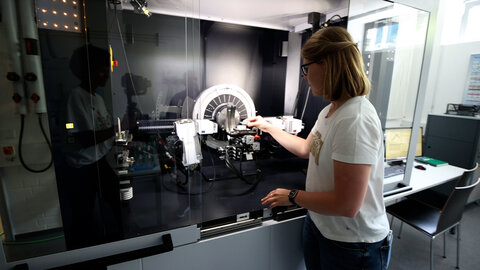Programme content and structure
The Applied Materials Science degree programme introduces you to the topics of materials and production engineering over the course of three standard semesters (or longer if you are studying part-time). You can expand your soft skills, including during internships and project work. You will complete your master's thesis and graduate with a Master of Science (MSc) degree.
Entry requirements
The master's in Applied Materials Science is aimed at materials engineers, medical engineers, mechanical engineers and production engineers as well as natural scientists who wish to expand their skills in the field of materials science.
The application process is based on a selection procedure. You need a completed first degree in the STEM field (210 ECTS credits). If you have fewer ECTS credits in your bachelor's degree, you can make up the missing credits during your master's degree.
Special features
The Tuttlingen Campus is equipped with a cutting-edge materials laboratory for the Materials Science programmes.
Bachelor's and master's students, doctoral candidates and cooperation partners can carry out experiments here for practical work or research and development. To date, the university and companies have invested several million euros in the technical equipment of the laboratory. This creates an ideal working environment for students, professors, doctoral candidates and companies.
"Powered by Industry"
Tuttlingen is not only the world centre of medical technology. The core sectors also include mechanical and plant engineering, the metalworking industry, precision mechanical equipment manufacturing, machine tool manufacturing, sensor, drive and control technology as well as automation and production technology. It is one of the strongest economic regions in the state and in Germany. If you study Applied Materials Science, you will be working closely with industry. High-profile companies have joined forces to form the Friends of Tuttlingen Campus Association and are actively involved in teaching and designing the degree courses. The Applied Materials Science programme is therefore practical, leading-edge and "Powered by Industry".
Your career prospects
Products of the future require answers to the complex requirements of parts and components. Materials science experts are in high demand in almost all industries. Our graduates work both in research and in the development of new materials for use in technical products. Thanks to their methodological knowledge and business management skills, they can also comfortably fill positions in quality assurance or technical management, for example.
Fields of work
- Materials research and product development
- Quality assurance
- Assumption of management and leadership responsibilities
- Development of manufacturing processes suitable for materials
- Medical technology
- Mechanical engineering/automotive
- Environmental technology/climate protection
Or should your academic path continue?
Internal link opens in the same window:Find out more about taking a doctorate at HFU
Events
Further dates and eventsUnfortunately, there are currently no events planned that we can display here. We have compiled an overview of all planned events in the event calendar.
Your key contacts
Your future is important to us. Contact us for advice.

University Climate Protection Representative

Deputy Dean of Studies Applied Materials Sciences (MSc) (AMV)
